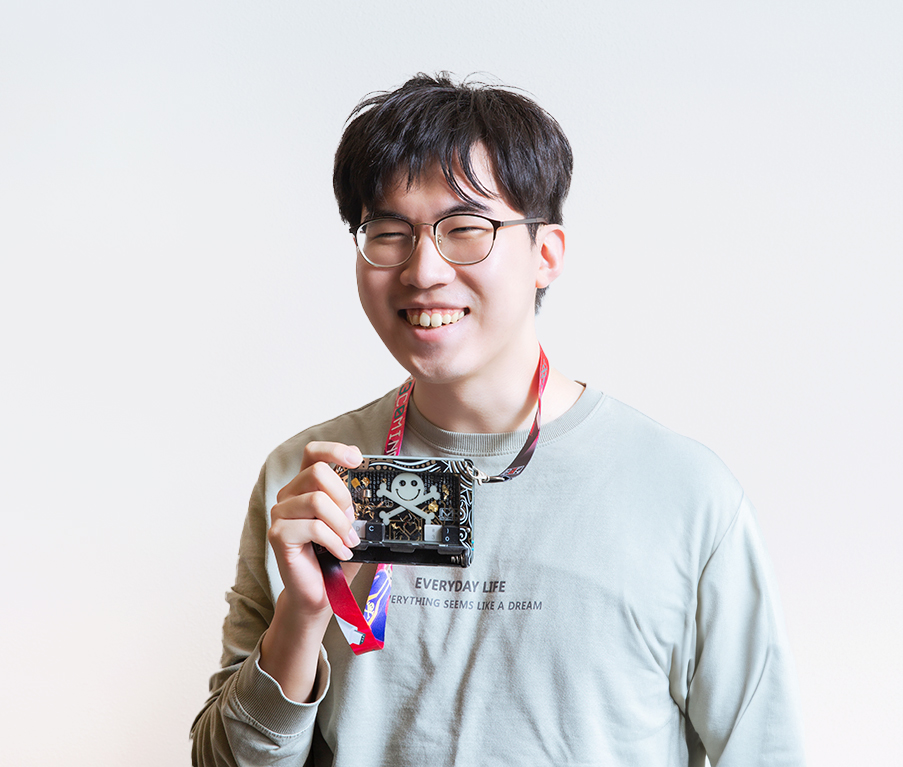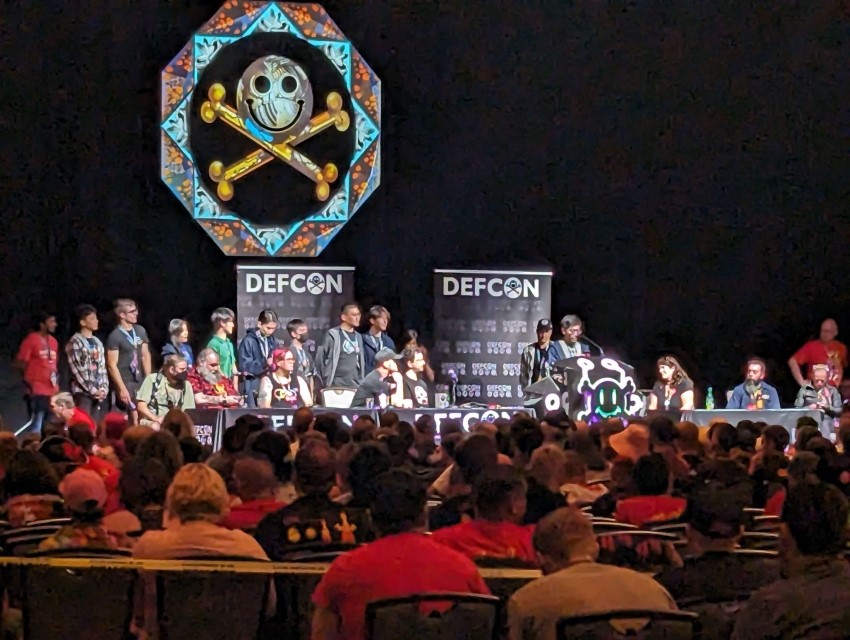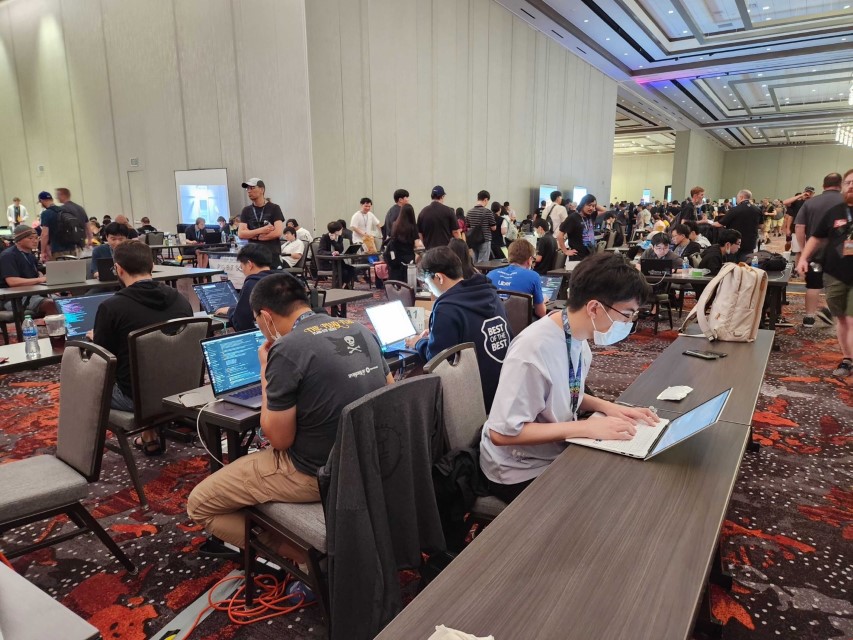- writing date 2024.02.08
- author KU TODAY
- hits 101
KU PEOPLE
Jin Yong-hui,
White-Hat Hacker
(2015, Department of Cyber Defense)
A resilient guardian
of the digital world

A cybersecurity expert known as a white-hat hacker or simply a white hacker is a professional who is skilled in identifying vulnerabilities in information systems and bolstering network security. Jin Yong-hui, a white-hat hacker and a graduate of the Department of Cyber Defense, boasts an impressive resume. As a teenager he began distinguishing himself by winning numerous hacking contests. After enrolling in university, he expanded his reach and began dominating in international competitions. In both 2022 and 2023, he clinched victories in the DEFCON CTF, the world’s most prestigious hacking defense competition, where security experts and hackers from around the globe compete against each other.
Coding your dreams in KU style
Jin was not initially interested in hacking. He wanted to be a programmer because he thought people who work with computers were cool, and he started studying programming when he was in elementary school.
“When I was in sixth grade, I enrolled in a computer academy. In my free time, I would try to solve problems in online communities and on algorithm problem websites, by studying these problems with a group of people. One day, a new problem website emerged, focused on how to exploit or close a loophole on a website. Collaborating with others to solve this problem piqued my interest in cybersecurity. By the end of my second year in junior high school, I had started studying hacking in earnest.”
During that time, there was no established training or process to cultivate hacking experts, so he had to learn most of his skills on his own. In high school, he honed his hacking skills by participating in various team competitions, in doing so developing a dream to become a top expert in cybersecurity. This ambition led him to the Department of Cyber Defense at Korea University.
“The first reason was that KU draws talented individuals from across the nation. The department boasts exceptional professors from whom you can learn about cybersecurity. Lastly, the existence of the Cykor club, which was formed by individuals who were renowned in hacking competitions within the department, was a significant draw.”
Both his academic pursuits and club activities served as the catalyst for Jin’s development of his hacking skills. Over four years, he participated in hacking competitions alongside other club members, and became the team’s fastest player in writing attack codes. While his individual skills were significant, it was his contribution to the team that brought him the greatest joy.
“Even now, I find myself missing the club room at school. It was my base camp, where I lived while attending classes and preparing for competitions. I wonder how students are using the room these days, and if there are any who utilize it as I did.”

“As a white-hat hacker, it’s crucial to uphold the right morals. Given the provocative nature of the field, it’s essential to maintain strong values. It’s also important to continuously contemplate the opportunities that could be lost through illegal activities.”


Participating in the world’s most prestigious hacking defense tournament, DEFCON
Qualities required in a white-hat hacker
As awareness of cybersecurity’s importance grows, many people are paying attention to cybersecurity and hacking. However, given its complexity and the breadth of knowledge it requires—spanning fields from software development to computer science—it can be rather intimidating for beginners. Jin suggests that it is natural to feel overwhelmed and lost when first venturing into the realm of hacking. Participating in practical competitions can serve as a valuable avenue for gaining a deeper understanding of this field.
“Most hacking competitions for teenagers were for individuals not teams, requiring me to tackle everything by myself. This entailed simultaneous study across various sub-fields, which paradoxically provided me with a comprehensive understanding of the discipline. Through these competitions, I was able to grasp the entirety of the field. As I journeyed down one stream of endeavor, I began to understand what areas required further study.”
While skill enhancement is crucial, Jin underscores three key qualities that a white-hat hacker should possess.
“First, persistence and creativity are essential. The role involves constant interaction with and analysis of new programs or services. In order to identify loopholes, one needs to scrutinize these systems from various angles, sometimes in great detail. Since the task is to unravel the thought process developers employed and spot the vulnerabilities they overlooked, it requires creativity to think outside the box. All of this means a great deal of persistence. Naturally, as a white-hat hacker, having the right morals is crucial. When you become aware of a vulnerability in a service or program, you may have a temptation to exploit or leak the information. Given its nature, the field involves provocative topics, and therefore a strong sense of ethics is paramount. You must remind yourself of the potential consequences of engaging in illegal activities.”
One step closer to joining the world’s leading security experts
Upon graduation, Jin paused his doctoral studies at the System Software and Security Lab (SSLab) of Georgia Institute of Technology to join cybersecurity startup Tiori as a research fellow. His experiences studying abroad and working at a startup have provided him with invaluable insights into the security field, allowing him to deepen his studies.
“Thus far, I’ve had the opportunity to be involved in the entire process, from planning to implementation to evaluation, whether through academic papers or participation in projects. I’ve been particularly impressed by the startup’s commitment to long-term investment in future-oriented technologies, rather than to seeking immediate results. Additionally, it has been an enriching experience to learn about diverse cultures and to develop a global network.”
Jin stands at the forefront of the digital world, safeguarding cybersecurity. “I always welcome KU students who have a passion for the field of white-hat hacking,” he says. His aim is to expose more people to the allure of the field. As he forges a new path in the world of cybersecurity, his boundless spirit of exploration and warm sense of humanity are palpable.
 7.jpg
7.jpg